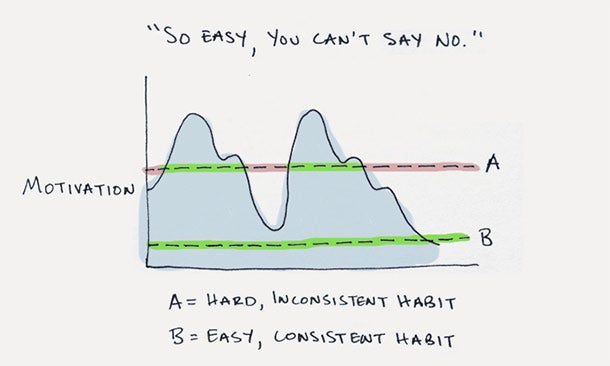3 Simple Ways to Make Exercise a Habit
Opinions expressed by Entrepreneur contributors are their own.
A lot of people want to build an exercise habit that sticks. (A 2012 survey analyzed the top 10 habits of thousands of people and found that exercise was number one by a long shot.)
Of course, wanting to make exercise a habit and actually doing it are two different things. Changing your behavior is difficult. Living a new type of lifestyle is hard. This is especially true when you throw in very personal feelings about body image and self-worth.
But there are some strategies that can make it easier to stick with an exercise habit.
I have been using the three strategies below to build my personal exercise routine, which I have stuck to for two years without skipping a workout. While I don’t claim to have all the answers, I’m happy to share what I’ve learned so far and how I have successfully made exercise a habit that am I excited to do each week.
Related: How Habits Shape Your Health, Happiness and Wealth
Here are 3 simple ways to make exercise a habit.
1. Develop a ritual to make starting easier.
Habits are behaviors that you repeat over and over again, which means they are also behaviors that you start over and over again. In other words, if you don’t consistently get started, then you won’t have a habit. In many ways, building new habits is simply an exercise in getting started time after time.
This means that if you can find a way to make getting started easier, then you can find a way to make building a habit easier. This is why rituals and routines are so important. If you can develop a ritual that makes starting your workout mindless and automatic, then it will be much easier to follow through.
Twyla Tharp’s hailing the cab ritual is a good example. You can start building your own ritual by stacking your exercise habit on top of a current habit or by setting a schedule for yourself. For example, you could set your intention to exercise by filling out this sentence:
During the next week, I will exercise on [DAY] at [TIME OF DAY] at/in [PLACE].
One research study showed that people who filled out this sentence above were 2 to 3 times more likely to exercise over the long run. This is a psychology concept called implementation intentions and there are hundreds of studies to back it up.
Related: Why You Should Measure Backward, Not Forward
2. Start with an exercise that is ridiculously small.
The best way to make exercise a habit is to start with an exercise that is so easy that you can do it even when you are running low on willpower and motivation. In the words of Leo Babauta, start with something that is so easy you can’t say no.

Here’s one strategy that you can use in the beginning: The 2-Minute Rule.
It’s very simple: focus on finding a way to get started in just 2 minutes rather than worrying about your entire workout.
Struggling to find motivation to go for a run? Just fill up your water bottle and put on your running shoes. That’s all you have to do to consider today’s workout a success. Often, this little 2 minute start will be enough to get your motivation flowing and help you finish the task.
3. Focus on the habit first and the results later.
The typical approach to diet and exercise is to focus on results first. Most people start with some type of goal. “I want to lose 20 pounds in the next 4 months.” Or, “I want to squat 50 pounds more six months from now.”
I think this is the wrong approach. It’s better to focus on the system rather than the goal.
What matters most in the beginning is establishing a new normal and building a new routine that you will stick to; not the results that you get. In other words, in the first 6 months it is more important to not miss workouts than it is to make progress. Once you become the type of person who doesn’t miss workouts, then you can worry about making progress and improving.
One way to do this is to set an upper limit on your behavior.
Related: Plan for Chaos: How to Stick to Your Health Goals When Life Gets Crazy
One member of our community, Mitch, set a rule for himself where he couldn’t stay in the gym for more than 5 minutes at the beginning. He had to go everyday, but he wasn’t allowed to stay for 6 minutes. He was focused on building the habit of not missing workouts. After doing that for a month or two, he had established a routine of going to the gym and he started to focus on doing more difficult workouts. Today, Mitch is over 100 pounds lighter. (Which, to be fair, is not just the result of exercise, but also diet and lifestyle changes.)
Once you build the habit of exercise, you can find thousands of ways to improve. Without the habit, every strategy is useless.
Build the habit first, worry about the results later.
A version of this article first published on JamesClear.com. For useful ideas on improving your mental and physical performance, join his free weekly newsletter.
A lot of people want to build an exercise habit that sticks. (A 2012 survey analyzed the top 10 habits of thousands of people and found that exercise was number one by a long shot.)
Of course, wanting to make exercise a habit and actually doing it are two different things. Changing your behavior is difficult. Living a new type of lifestyle is hard. This is especially true when you throw in very personal feelings about body image and self-worth.
But there are some strategies that can make it easier to stick with an exercise habit.





